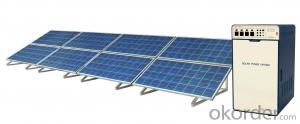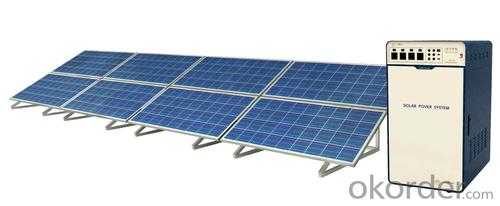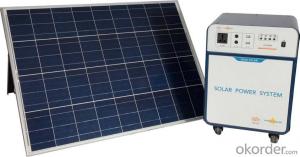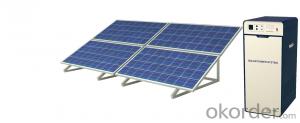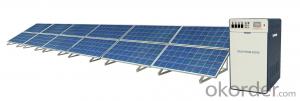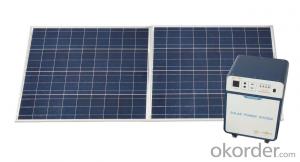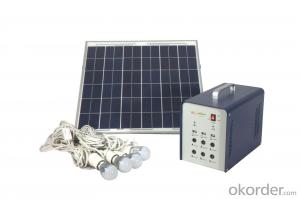Suncraft Solar Energy Systems JS-SPS-2000 Off-Grid Solar Power System
- Loading Port:
- Tianjin
- Payment Terms:
- TT OR LC
- Min Order Qty:
- 10 set
- Supply Capability:
- 10000 set/month
OKorder Service Pledge
Quality Product, Order Online Tracking, Timely Delivery
OKorder Financial Service
Credit Rating, Credit Services, Credit Purchasing
You Might Also Like
General Introduction
Solar power system provides alternating current and direct current, which is produced by the modules transforming solar power into power, to home lighting, household appliance and other DC appliance, such as cell phone and laptop.
Solar power system is widely used in area lack of power, for example house power supplying, monitoring, communication base, fire prevention in forest area, pasture and meadow, aquaculture etc.
We are dedicated to provide high quality off-grid PV products and systems to customers and has received a series of certificate, including ISO9001, TUV, UL, CE, CQC and RoHS.
Off-grid Solar Power System
High efficent PV module can produce more power.
Sine wave output is suitable for all kinds of load. Varieties of DC output, let it more
convenient for users.
The multifunction design make it easy to operation and maintenance.
Solar power system provides alternating current and direct current, which is produced by the modules transforming solar power into power, to home lighting, household appliance and other DC appliance, such as cell phone and laptop.
Solar power system is widely used in area lack of power, for example house power supplying, monitoring, communication base, fire prevention in forest area, pasture and meadow, aquaculture etc.
We are dedicated to provide high quality off-grid PV products and systems to customers and has received a series of certificate, including ISO9001, TUV, UL, CE, CQC and RoHS.
Off-grid Solar Power System
High efficent PV module can produce more power.
Sine wave output is suitable for all kinds of load. Varieties of DC output, let it more
convenient for users.
The multifunction design make it easy to operation and maintenance.
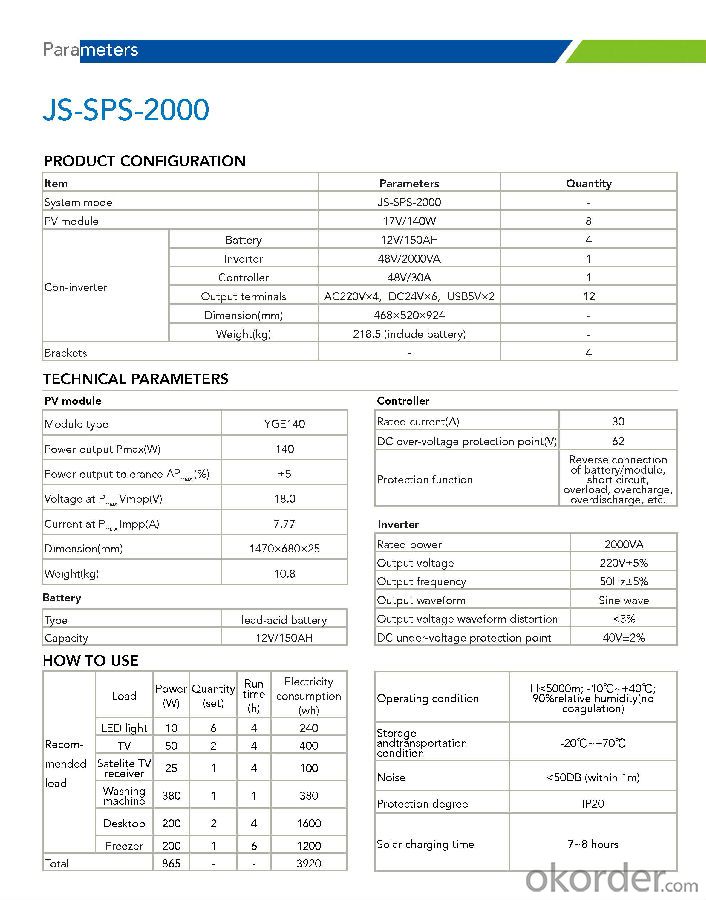
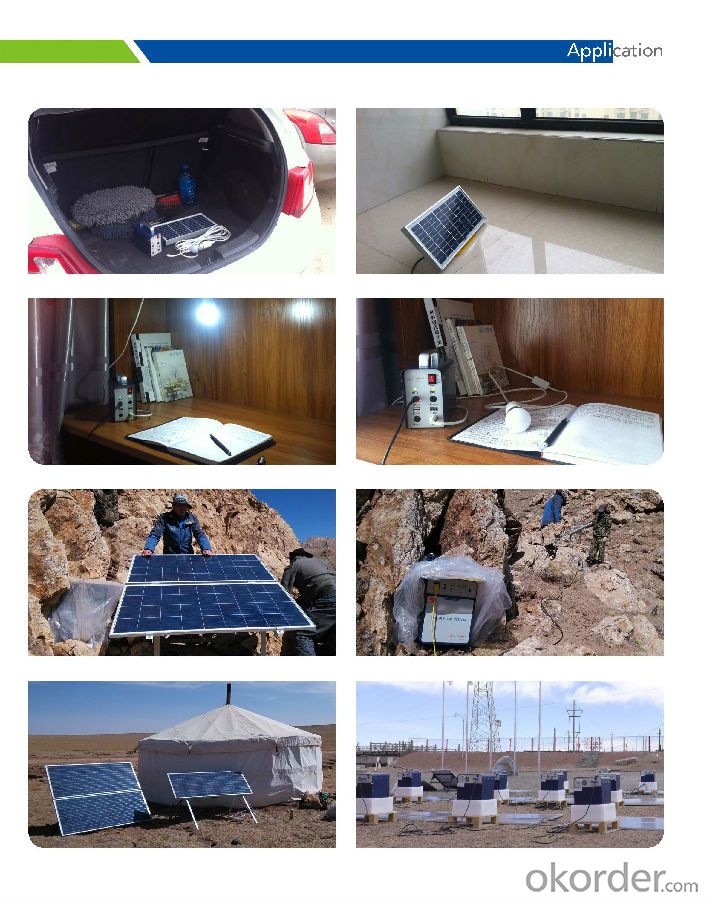

- Q: Can a solar energy system be installed in an area with a high lightning risk?
- Yes, a solar energy system can be installed in an area with a high lightning risk. However, proper precautions and safety measures should be taken to minimize any potential risks. Lightning protection systems can be installed to divert the electrical charge away from the solar panels, inverters, and other equipment. Grounding systems and surge protectors can also be implemented to provide additional protection. It is important to consult with a qualified professional who can assess the specific risks and design a system that meets the necessary safety standards for the area.
- Q: Can solar energy systems be used in developing countries without access to reliable electricity?
- Yes, solar energy systems can be used in developing countries without access to reliable electricity. Solar power is a sustainable and renewable energy source that can be harnessed to provide electricity in areas where grid connectivity is limited or non-existent. By installing solar panels and utilizing energy storage systems, developing countries can generate their own clean and affordable electricity, reducing dependence on fossil fuels and improving the quality of life for their communities. Additionally, solar energy systems are relatively easy to install, require minimal maintenance, and have a long lifespan, making them a viable option for remote and rural areas in developing countries.
- Q: What is the expected return on investment for a solar energy system?
- The expected return on investment for a solar energy system can vary depending on several factors such as the initial cost, location, available incentives, and energy usage. Generally, a solar energy system is expected to provide a positive return on investment over its lifetime. The initial cost of installing a solar energy system can be a significant investment, including the cost of solar panels, inverters, and installation. However, with the decreasing costs of solar technology in recent years, the upfront expense has become more affordable. The location of the solar energy system plays a crucial role in determining the expected return on investment. Areas with higher solar irradiance and longer sunshine hours tend to generate more electricity, resulting in a higher return. Additionally, the availability of net metering policies, which allow excess electricity to be fed back into the grid and credited to the owner, can further enhance the return on investment. Incentives and subsidies provided by governments and local authorities can significantly impact the expected return on investment. Many countries offer tax credits, grants, and rebates to encourage the adoption of solar energy systems. These incentives can reduce the initial cost and accelerate the payback period, enhancing the overall return on investment. Furthermore, the energy usage of the property is a critical factor in determining the expected return on investment. Higher electricity consumption means a greater opportunity for the solar energy system to offset utility bills, resulting in higher savings and an improved return on investment. While the specific return on investment can vary, studies have shown that solar energy systems typically pay for themselves within 5 to 10 years and continue generating free electricity for several decades. This extended period of energy production allows for significant savings on utility bills and a positive return on investment over the system's lifetime. Overall, investing in a solar energy system can provide long-term financial benefits through reduced electricity costs, potential revenue from excess electricity generation, and increased property value. It is crucial to perform a thorough evaluation considering the specific factors mentioned above to determine the expected return on investment for a solar energy system in a particular scenario.
- Q: Can solar energy systems be used for waste management?
- Yes, solar energy systems can be used for waste management. Solar power can be utilized to power various waste management processes such as waste-to-energy systems, composting facilities, and recycling plants. Solar panels can generate electricity to run equipment, machinery, and lighting, reducing the reliance on traditional energy sources and minimizing the carbon footprint of waste management operations. Additionally, solar energy can be integrated into off-grid waste management solutions in remote areas, making it a sustainable and environmentally friendly option for waste management.
- Q: How do solar energy systems impact the energy efficiency of buildings?
- The energy efficiency of buildings can be greatly improved by solar energy systems, which have a significant positive effect. These systems harness the power of the sun, providing clean and renewable energy that lessens the reliance on traditional fossil fuels. Consequently, this leads to a decrease in greenhouse gas emissions and aids in the fight against climate change. One of the primary methods by which solar energy systems enhance the energy efficiency of buildings is through on-site electricity generation. By directly converting sunlight into electricity, these systems eliminate the need for conventional methods of electricity generation that often result in energy losses during transmission and distribution. This on-site generation reduces the overall energy consumption of the building and minimizes energy waste. Furthermore, solar energy systems also contribute to the energy efficiency of buildings by diminishing the demand for electricity from the grid. During periods of peak energy demand, such as scorching summer days, solar panels can supply a substantial portion of a building's electricity needs, easing the strain on the grid. This not only helps stabilize the electricity supply but also decreases the necessity for additional power plants, which are frequently powered by non-renewable sources. Moreover, solar energy systems can be combined with energy storage technologies, such as batteries, to store excess electricity generated during the day for use during times of low solar generation or high energy demand. This enables buildings to become more self-sufficient in terms of energy supply and reduces reliance on the grid when electricity prices may be higher. In addition to generating electricity, solar energy systems can also be utilized for heating purposes. Solar thermal systems can be employed to heat water for domestic use or to provide space heating, further reducing the energy consumption of buildings. By directly utilizing the sun's heat, these systems eliminate the need for conventional heating methods, like gas or electric heaters, which consume significant amounts of energy. Overall, solar energy systems have a profound impact on the energy efficiency of buildings. They reduce energy consumption, minimize energy waste, lower greenhouse gas emissions, and contribute to a more sustainable and environmentally friendly energy future.
- Q: Can solar energy be used in cloudy climates?
- Yes, solar energy can still be used in cloudy climates. While the efficiency of solar panels may decrease in cloudy conditions, they are still capable of generating electricity. Additionally, advancements in solar technology, such as the use of thin-film solar cells, have improved the ability to harness solar energy even in low light conditions.
- Q: Can solar energy systems be used for heating water in commercial buildings?
- Yes, solar energy systems can be effectively used for heating water in commercial buildings. Solar water heating systems use the sun's energy to heat water, which can then be used for various purposes in commercial buildings such as showers, sinks, and other hot water needs. These systems are cost-effective, environmentally friendly, and can significantly reduce the reliance on traditional fossil fuel-based heating methods.
- Q: Can solar panels be installed on different surfaces like glass or metal?
- Yes, solar panels can be installed on different surfaces like glass or metal. In fact, solar panels are commonly installed on rooftops, which are often made of materials like glass, metal, or asphalt shingles. The most common type of solar panels, known as photovoltaic (PV) panels, are designed to be mounted on a variety of surfaces. The installation process involves securing the panels to the surface using racks or frames, ensuring that they are properly angled to maximize sunlight exposure. Whether it is a glass or metal surface, solar panels can be installed and effectively generate electricity from the sun's energy.
- Q: Can solar energy systems be used in areas with limited land availability?
- Yes, solar energy systems can be used in areas with limited land availability. There are various types of solar energy systems that can be installed in such areas, including rooftop solar panels, solar parking canopies, and solar walls. These systems utilize the vertical space available and can be integrated into existing structures, making them suitable for areas with limited land availability. Additionally, advancements in solar technology have made it possible to generate more electricity from smaller areas, further increasing the feasibility of solar energy systems in limited land areas.
- Q: Do solar energy systems require a backup battery system?
- No, solar energy systems do not necessarily require a backup battery system. However, adding a battery storage system can provide benefits such as storing excess energy generated during the day for use at night or during power outages.
Send your message to us
Suncraft Solar Energy Systems JS-SPS-2000 Off-Grid Solar Power System
- Loading Port:
- Tianjin
- Payment Terms:
- TT OR LC
- Min Order Qty:
- 10 set
- Supply Capability:
- 10000 set/month
OKorder Service Pledge
Quality Product, Order Online Tracking, Timely Delivery
OKorder Financial Service
Credit Rating, Credit Services, Credit Purchasing
Similar products
Hot products
Hot Searches
Related keywords
